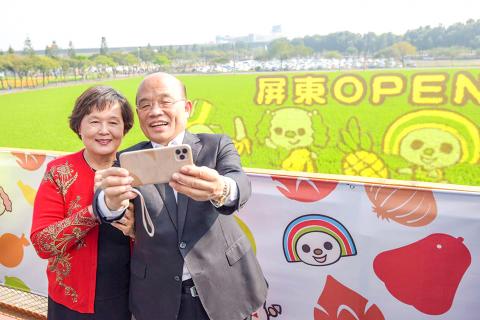Premier Su Tseng-chang (蘇貞昌) yesterday dismissed a newspaper report that said the only way for President Tsai Ing-wen’s (蔡英文) administration to show goodwill toward China would be to reshuffle the Cabinet.
The president does not need the opinion of other countries to make plans, Su added.
Citing an anonymous “key cross-strait policymaker” in the government, the Chinese-language United Daily News yesterday reported that the only way Tsai’s administration could extend its goodwill toward China would be through a Cabinet reshuffle.

Photo courtesy of the Pingtung County Government via CNA
Beijing could reciprocate by lifting a ban on individual travelers to Taiwan, as well as allowing larger tour groups and more officials handling Taiwan affairs to visit the nation, the United Daily quoted the source as saying.
Tsai would likely accept the goodwill of Beijing, which controls the situation, the source was quoted as saying.
“Taiwan is a sovereign nation... At the start of her second term, President Tsai will have new plans and take new measures. Other countries should not poke their noses into this,” Su said in response to media queries about the report.
The Chinese-language China Times yesterday reported that Tsai would likely be re-elected as Democratic Progressive Party (DPP) chairperson, while Legislative Speaker Su Jia-chyuan (蘇嘉全) would replace Chen Chu (陳菊), who plans to retire, as Presidential Office secretary-general.
Su Tseng-chang would stay on as premier, while former premier Yu Shyi-kun (游錫堃) would be named legislative speaker and would share the duty of presiding over legislative proceedings with Deputy Legislative Speaker Tsai Chi-chang (蔡其昌), the report said.
DPP Chairman Cho Jung-tai (卓榮泰) would likely become a Cabinet member, as he has extensive administrative experience and was instrumental in securing the DPP’s election victories on Saturday last week, it said.
Asked for his thoughts on Su Jia-chyuan becoming Presidential Office secretary-general, Su Tseng-chang said that Su Jia-chyuan is a very capable person, but that he would respect Tsai’s plans.
Asked about members of the DPP’s former New Tide faction having been left out of any reshuffle and whether the move was aimed at balancing power among the factions, Su Tseng-chang said the party would not give in to factionalism after winning the elections.
As a democratic party, rivalry within the party would inevitably spark competition between factions, but the DPP must prioritize the expectations of the people, who just gave Tsai another term, the premier said.
Tsai would certainly base her actions on public opinion and make any plans based on each government official’s expertise, he said.
The Presidential Office yesterday rejected the China Times’ report.
The office would respect the autonomy of the legislature and the caucuses in electing the legislative speaker, Presidential Office spokesman Xavier Chang (張惇涵) said, adding that the report was baseless.

CHANGING LANDSCAPE: Many of the part-time programs for educators were no longer needed, as many teachers obtain a graduate degree before joining the workforce, experts said Taiwanese universities this year canceled 86 programs, Ministry of Education data showed, with educators attributing the closures to the nation’s low birthrate as well as shifting trends. Fifty-three of the shuttered programs were part-time postgraduate degree programs, about 62 percent of the total, the most in the past five years, the data showed. National Taiwan Normal University (NTNU) discontinued the most part-time master’s programs, at 16: chemistry, life science, earth science, physics, fine arts, music, special education, health promotion and health education, educational psychology and counseling, education, design, Chinese as a second language, library and information sciences, mechatronics engineering, history, physical education

DEADLOCK: As the commission is unable to forum a quorum to review license renewal applications, the channel operators are not at fault and can air past their license date The National Communications Commission (NCC) yesterday said that the Public Television Service (PTS) and 36 other television and radio broadcasters could continue airing, despite the commission’s inability to meet a quorum to review their license renewal applications. The licenses of PTS and the other channels are set to expire between this month and June. The National Communications Commission Organization Act (國家通訊傳播委員會組織法) stipulates that the commission must meet the mandated quorum of four to hold a valid meeting. The seven-member commission currently has only three commissioners. “We have informed the channel operators of the progress we have made in reviewing their license renewal applications, and

The High Prosecutors’ Office yesterday withdrew an appeal against the acquittal of a former bank manager 22 years after his death, marking Taiwan’s first instance of prosecutors rendering posthumous justice to a wrongfully convicted defendant. Chu Ching-en (諸慶恩) — formerly a manager at the Taipei branch of BNP Paribas — was in 1999 accused by Weng Mao-chung (翁茂鍾), then-president of Chia Her Industrial Co, of forging a request for a fixed deposit of US$10 million by I-Hwa Industrial Co, a subsidiary of Chia Her, which was used as collateral. Chu was ruled not guilty in the first trial, but was found guilty

Taiwan People’s Party (TPP) Chairman Huang Kuo-chang (黃國昌) yesterday appealed to the authorities to release former Taipei mayor Ko Wen-je (柯文哲) from pretrial detention amid conflicting reports about his health. The TPP at a news conference on Thursday said that Ko should be released to a hospital for treatment, adding that he has blood in his urine and had spells of pain and nausea followed by vomiting over the past three months. Hsieh Yen-yau (謝炎堯), a retired professor of internal medicine and Ko’s former teacher, said that Ko’s symptoms aligned with gallstones, kidney inflammation and potentially dangerous heart conditions. Ko, charged with